Fake News and Brief Counseling
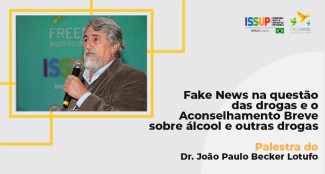
Brazil and the world are experiencing an epidemic of fake news on various subjects, but especially on drugs. And this number of Fake News has been increasing, year by year.
And why is this so important in the case of drugs? Because the young people's information comes from there: through the internet, through social networks, through 'word of mouth'... When it comes to cigarettes, we don't see much fake news, because it's already a well-worked subject in Brazil, but when we think about marijuana, alcohol and today electronic cigarettes, we can see that there is a lot of fake news spreading as if it were true.
To talk about this subject and also to share with the participants of the 7th Freemind International Congress 2022, the Brief Counseling Program on Alcohol and Other Drugs, Freemind Mobilization and ISSUP Brazil invited Dr. João Paulo Becker Lotufo, a partner since our first steps.
Dr. Lotufo holds a Master's and PhD in Pediatrics from the University of São Paulo, representative of the Society of Pediatrics in the actions to combat alcohol, tobacco and drugs, coordinator/president of the working group on Combating Drug Use by Children and Adolescents in the Society of Pediatrics of São Paulo, responsible for the Anti-Smoking Project of the University Hospital of USP and responsible for the project Dr. Bartô and the Doctors of Health – Drug Prevention Project in Elementary and Secondary Education.
Check out some of what Dr. Lotufo told us and watch his full lecture in Portuguese in https://bit.ly/3LSxs89 or in English in https://bit.ly/3xZxENo. You can also download the presentation in https://bit.ly/3RjZqei.
Fake News – what is it?
Fake news: intentional and false news that can mislead the reader. The term of the year, according to the Oxford dictionary, became popular in the U.S. presidential elections.
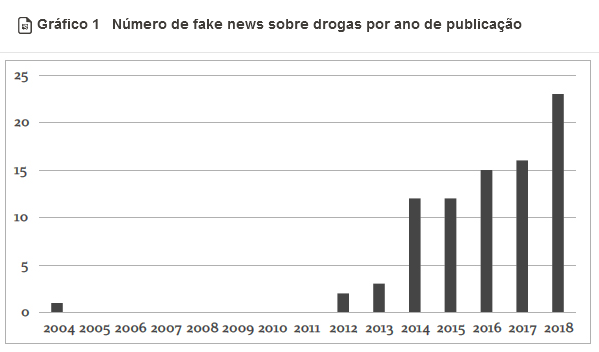
Available in https://doi.org/10.1590/S0104-12902020190342
Some Fake News disseminated:
"Drinking a little and driving doesn't matter"; "I live nearby" – FAKE NEWS
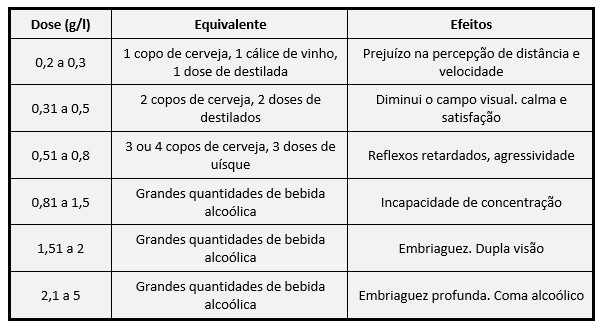
As you can see from the table above, just one glass of beer or wine is enough to impair the perception of distance and speed.
Another thing that is quite worrying is the age at which alcohol use begins: 5th grade students already use alcohol – a drug forbidden to minors – and the same happens with tobacco, marijuana and crack, according to Dr. Lotufo in his publication Alcohol, Tobacco and Marijuana – Pediatric Drugs - 2nd edition.
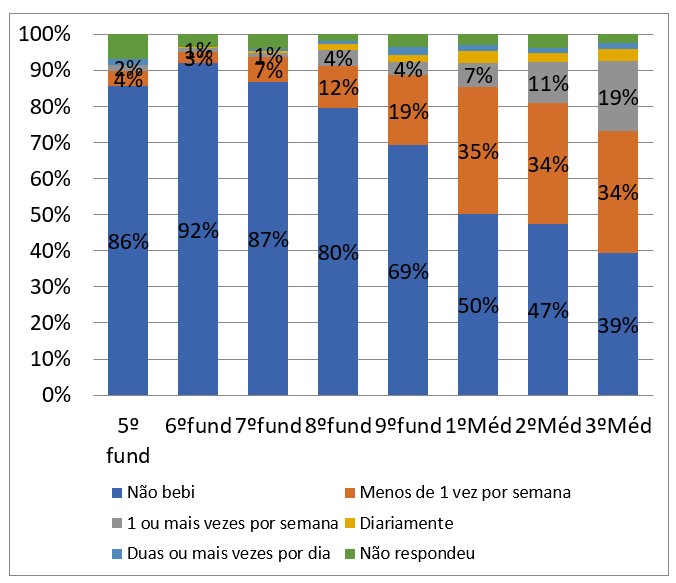
The earlier you start using substances, the higher the risk of addiction.
"During pregnancy I can drink just a little bit" – FAKE NEWS
Any alcoholic beverage consumed by the mother crosses the placental barrier and reaches the baby, who is exposed to the same concentration of alcohol consumed by the mother.
The risks of alcohol use during pregnancy are miscarriage, premature birth, low birth weight newborns, physical abnormalities, decreased fetal and brain growth, and Fetal Alcohol Syndrome – an extremely violent neurological disease with deformity of the brain and the whole body.
"Everyone uses marijuana" – FAKE NEWS
This is a lie! Only 7% of the Brazilian population routinely uses marijuana.

"Amsterdam is the city where drugs are released" – FAKE NEWS
In the 70's and 80's, when in Amsterdam there was marijuana tourism it could be. But today, there are many rules that make the above information a Fake News: it is not everywhere that you can smoke, there are 'alcohol-free zones', you can have 4 marijuana plants on your terrace, but you cannot walk around with the drug.
In the famous Coffeeshops of the Netherlands, places where you can try the drug, alcoholic beverages are not served. In addition, an analysis by The Economist shows that the number of coffeeshops has already been declining for many years, due to the increase in the Netherlands' intolerance towards marijuana: in 1995 there were 350 and in 2017 there were only 167.
There, too, the police are in plain clothes and the rules are enforced, with heavy fines for those who do not comply with the legislation.
"Marijuana has no risk" – FAKE NEWS
In U.S. states where marijuana has been legalized and use has increased, the number of deaths in automobile accidents has doubled. Another worrisome fact in these states was the increase in exogenous intoxication by marijuana use, especially in children from zero to five years old due to the use of marijuana in food, widely publicized by marketing strategies: marijuana cake, Coca Cola with marijuana, lollipop with marijuana...
For a child from 0 to 5 years old, this is life-threatening!
An absurd term that has been spreading: Medical marijuana. There is no such thing as medical marijuana! What exists are cannabinoids or medicinal cannabidiols – plant substances that are already known in the medical world and that have a therapeutic purpose.
For example, morphine, a drug that has been used for a long time in cases of heart attacks, kidney stones and other medical needs, is extracted from the poppy plant, from which heroin is extracted. However, medicinal poppy has never been heard of! It is the morphine that is medicinal and not the heroin or the poppy... And it's the same with marijuana.
In addition, the impact of alcohol and marijuana on adolescents can cause: school discrepancy (45.9%), school absences and dropouts, hospitalization, involvement in situations of violence, falls and drowning, dependence on other drugs and other diseases, family problems, unplanned pregnancies, AIDS and other STDs, among other problems.
"Legal drugs do not lead to illicit drugs" - That's a lie!
Among heavy drinkers, 37 percent switch to other drugs, while among non-drinkers only 2 percent switch to other drugs.
What can we conclude from this? Where is the prevention of illicit drugs? It's in the Prevention of the Licit Drug!
Of those who smoke heavily, 33% turn to other drugs, while among those who do not smoke, this rate was zero, but today marijuana already takes the place of tobacco as the first drug.
Hookah doesn't hurt, it's not tobacco and it has a filter! - FAKE NEWS
Hookah smoke is made up of tobacco and has harmful substances, such as nicotine. A hookah smoker, in one hour of use, can swallow up to 50 liters of smoke, that is, the same amount that is inhaled in 100 cigarettes.
"Electronic Cigarettes were created to reduce the risk of tobacco for those who cannot quit smoking" – FAKE NEWS
At a time when the number of cigarettes smoked in the world is decreasing, and tobacco-free environments are spreading, the tobacco industry is organizing to try to replace what it is losing and introducing the electronic cigarette to the market, claiming that, for the elderly smoker, it would be better to smoke the electronic cigarette than the conventional cigarette.
This is the purest lie! The advertising of electronic cigarettes is made with the young in mind and not the elderly. In addition, an e-cigarette has up to 15 times the amount of nicotine as a regular cigarette.
What is addictive in regular cigarettes is nicotine! So, is the marketing of this type of device done for seniors who can't quit smoking or for the young person who is starting out in tobacco and who will become dependent on nicotine in a short time and who will soon be using regular cigarettes or even marijuana?
Not to mention the fact that it is carcinogenic and has caused pneumonia in the United States: thousands of addicted young people, 68 deaths as of December 2019, and two transplants in adolescents due to severe lung injury. After that date, not much was said about electronic cigarettes, because the COVID pandemic took over the media, but lung lesions are already appearing in Brazil.
The billion-dollar company that launched Juul (electronic smoking device) in 2015 (valued at $16 billion, according to the New York Times in September 2018), controls the market with 72% of e-cigarette sales.
According to the FDA, more than 2 million middle and high school students regularly use the devices.
With this, we must consider: 150,000 people die in Brazil every year because of cigarettes and 100,000 because of alcohol. If we add to these numbers the amount of people who use marijuana, synthetic drug and other drugs, we surpass the number of deaths from COVID during a year.
In the case of COVID, protective measures were quickly imposed: masks, isolation, vaccine... But what about drugs? What are we doing? Just one-off things, not very effective.
Young people say , "I use it because I want to, and the moment I want to stop, I stop!" Some parents say "I wish my child didn't do drugs, but I'm glad it's just marijuana" or "I'm glad it's just e-cigarettes"...
Parents themselves are unaware of the risk of drugs!
Brief Counseling
Going to a school, giving a super lecture about drugs and never talking about it again DOESN'T WORK!
For this reason, Dr. Lotufo advises the use of Brief Counseling, an ongoing program in schools, churches, or families. These programs have yielded effective results in reducing smoking and alcohol consumption.
Dr. Lotufo mentioned that it has been proven that brief counseling works: short but continuous information. Over the course of a year, he and his team developed 9 activities in ten public schools around the University of São Paulo and managed to reduce drug experimentation by 60%.
Dr. Barty's booklets were distributed in schools once a month to remind them of the message they had previously conveyed. Children identify the character as someone nice, a friend, a companion and so it is easier to reach the children.
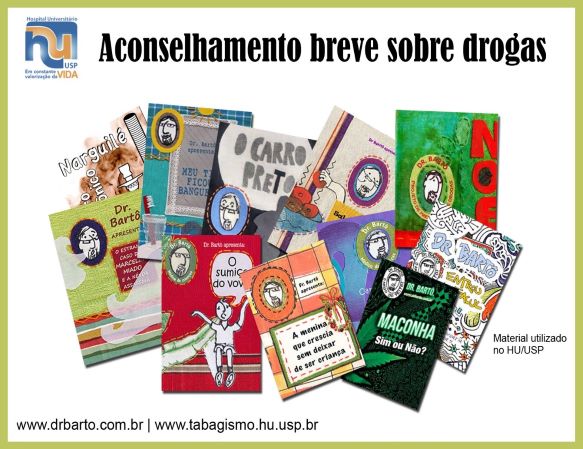
And the children take it home and change the routine of the residences. As an example, Dr. Lotufo cites a 75-year-old man who came to his office of the Anti-Smoking Project at HU-USP wanting to quit smoking due to the fact that every time he lit a cigarette, his grandson made him read one of Dr. Bartô's booklets, received during Brief Counseling at his school.
It can be seen from this that actions like this reach children, working on prevention, and reach families as well.
Brief Counseling can be used in the day-to-day lives of doctors and health workers, in families, in churches, in schools and even in politics, since it is politicians who vote on laws.